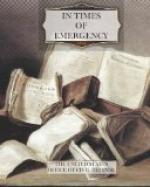In those parts of the country subject to hurricanes or floods, it is also wise to keep on hand certain emergency materials you may need to protect your home from wind and water—such as plywood sheeting or lumber to board up your windows and doors, and plastic sheeting or tarpaulins to protect furniture and appliances.
FIRE PROTECTION AND FIRE FIGHTING
Fires are a special hazard in a time of disaster. They may start more readily, and the help of the fire department may not be available quickly. Therefore, it is essential that you:
1. Follow the fire prevention rules given on page 52, and be especially careful not to start fires.
2. Know how to put out small fires yourself. (See pages 52-54.)
3. Have on hand simple tools and equipment needed for fire fighting. (See page 43.)
AFTER A NATURAL DISASTER
Use extreme caution in entering or working in buildings that may have been damaged or weakened by the disaster, as they may collapse without warning. Also, there may be gas leaks or electrical short circuits.
Don’t bring lanterns, torches or lighted cigarettes into buildings that have been flooded or otherwise damaged by a natural disaster, since there may be leaking gas lines or flammable material present.
Stay away from fallen or damaged electric wires, which may still be dangerous.
Check for leaking gas pipes in your home. Do this by smell only— don’t use matches or candles. If you smell gas, do this: (1) Open all windows and doors, (2) Turn off the main gas valve at the meter, (3) Leave the house immediately, (4) Notify the gas company or the police or fire department, (5) Don’t re-enter the house until you are told it is safe to do so.
If any of your electrical appliances are wet, first turn off the main power switch in your house, then unplug the wet appliance, dry it out, reconnect it, and finally, turn on the main power switch. (Caution: Don’t do any of these things while you are wet or standing in water.) If fuses blow when the electric power is restored, turn off the main power switch again and then inspect for short circuits in your home wiring, appliances and equipment.
Check your food and water supplies before using them. Foods that require refrigeration may be spoiled if electric power has been off for some time. Also, don’t eat food that has come in contact with flood waters. Be sure to follow the instructions of local authorities concerning the use of food and water supplies.
If needed, get food, clothing, medical care or shelter at Red Cross stations or from local government authorities.
Stay away from disaster areas. Sightseeing could interfere with first aid or rescue work, and may be dangerous as well.




